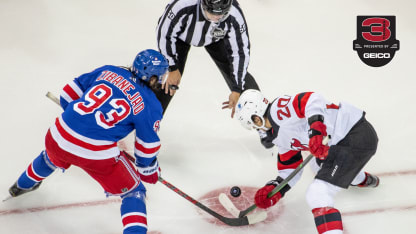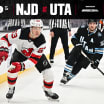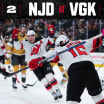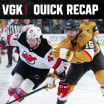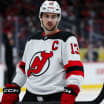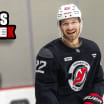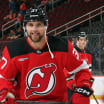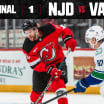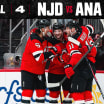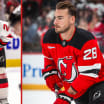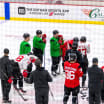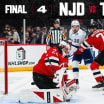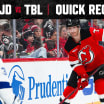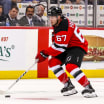Special teams may be the most obvious micro factor in a game (or even series).
However, what really makes special teams stand out in the postseason is their scarcity. Less penalties are called during the playoffs. Meaning less special teams opportunities. Meaning every power play takes on even greater importance than during the regular season.
"Playoffs are always tight games. If you're good in special teams you can decide games," Devils captain Nico Hischier said. "That's going to be a big factor."
"You'll always point to a situation or opportunity inside of a game, whether it's a big kill or it's a power-play goal, that sometimes made a difference in the game," Ruff said.
One intriguing battle will be the Devils' 4th-ranked penalty kill against the Rangers' 7th-ranked power play.
In the past 13 games, New Jersey had killed 87.5 percent of penalties against (28-for-32). In the last nine games for the Rangers, their power play has struck nine times in 22 tries, a whopping 40.9-percent success rate.
"They have a really good power play," defenseman John Marino said. "It's going to be important for us to stay out of the box. Penalty kill is going to be important the whole series."
One player the Devils may key in on is New York's Mika Zibanejad, who has 20 power-play goals and 39 power-play points on the season. Those numbers ranked third (tied) and sixth (tied) respectively in the entire NHL. Only Edmonton's Leon Draisaitl (32) and Connor McDavid (21) had more man-advantage goals than Zibanejad.
And aside from Zibanejad, the Rangers also have Chris Kreider, Patrick Kane, Artemi Panarin and Adam Fox on the top power-play unit.
"They have a lot of skill up front. They don't need as many shots as other teams do," Ruff said. "They have some real good shooters when you look at Zibanejad, Panarin, (Vladimir) Tarasenko, Kane."
"They have a really good power play. We need to find a way to neutralize that," defenseman Ryan Graves said. "We can't let that be a deciding factor in the series. They're going to get good chances and they're going to score. We just have to minimize it and try to keep momentum our way and let our power play do the same against them."
The Devils PK will have to do its job. And at the other, the Devils power play has to make the most of its limited chances.
"Momentum is a thing that can really swing a series. Your power play can really win you games," Graves said. "There aren't as many penalties and as many opportunities. You need to kill momentum when you can and gain momentum when you can on the other side of things."
"Special teams is definitely a big factor, penalty kill and power play," forward Timo Meier said. "We've prepared for it all season. Now the time is here. I think we're excited. We want to rise with the playoffs."
